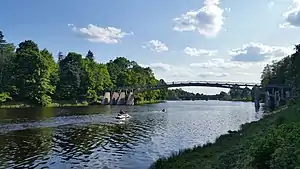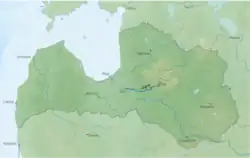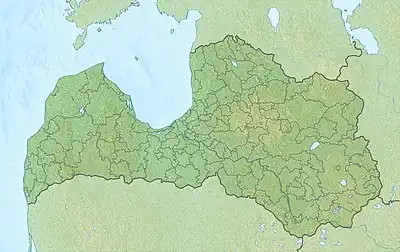| Ogre | |
|---|---|
 Ogre river in Ogre city. | |
 | |
 Latvia | |
| Location | |
| Country | Latvia |
| Physical characteristics | |
| Source | |
| • location | Sivēniņš lake in Liezēre parish |
| • elevation | 222 m (728 ft) |
| Mouth | Daugava |
• location | Ogre |
• coordinates | 56°48′39″N 24°36′06″E / 56.8108°N 24.6017°E |
| Length | 188 km (117 mi) |
| Basin size | 1,730 km2 (670 sq mi) |
| Basin features | |
| Progression | Daugava→ Baltic Sea |
| Tributaries | |
| • left | Lobe |
| • right | Līčupe, Ranka |
The Ogre is a river in Latvia. The 188 kilometers long Orge is a right tributary of the river Daugava. In the 13th century, the Ogre was called Wogen or Woga.
Etymology
There are three main versions of the etymology of Ogre's name (both town and river). The first states that the name of the river from which this city derives its name is of Russian origin (угри, ugri, meaning "eels") because there used to be many eels in the river Ogre. A popular folk legend says that Catherine the Great of Russia was the one who gave the river this name because there were a lot of eels in the river;[1] however, this lacks any evidence. Whereas Estonian linguist Paul Alvre takes into consideration an older form of the Ogre river's name (Wogene, Woga) first found in Livonian Chronicle of Henry (1180–1227), and argues that it cognates with Estonian word voog (with possible meanings: "stream, flow, waves"), therefore showing connection with Finno-Ugric languages, most probably early Livonian language.
A third etymology gives a reconstructed form *Vingrē, related to Lithuanian vingrùs, "meandering, curly" or Latvian vingrs, "nimble;" thus meaning "the meandering river"; the village of Engure has the same root.[2]
See also
References
- ↑ "Ogre – pilsēta uz sliedēm". Diena. Retrieved 28 July 2014.
- ↑ Kollektiv artorov (5 September 2017). Балто-славянские исследования. XVIII: Сборник научных трудов [Balto-Slavonic studies. XVIII: Collection of scientific papers] (in Russian). Litres. ISBN 9785457366732 – via Google Books.